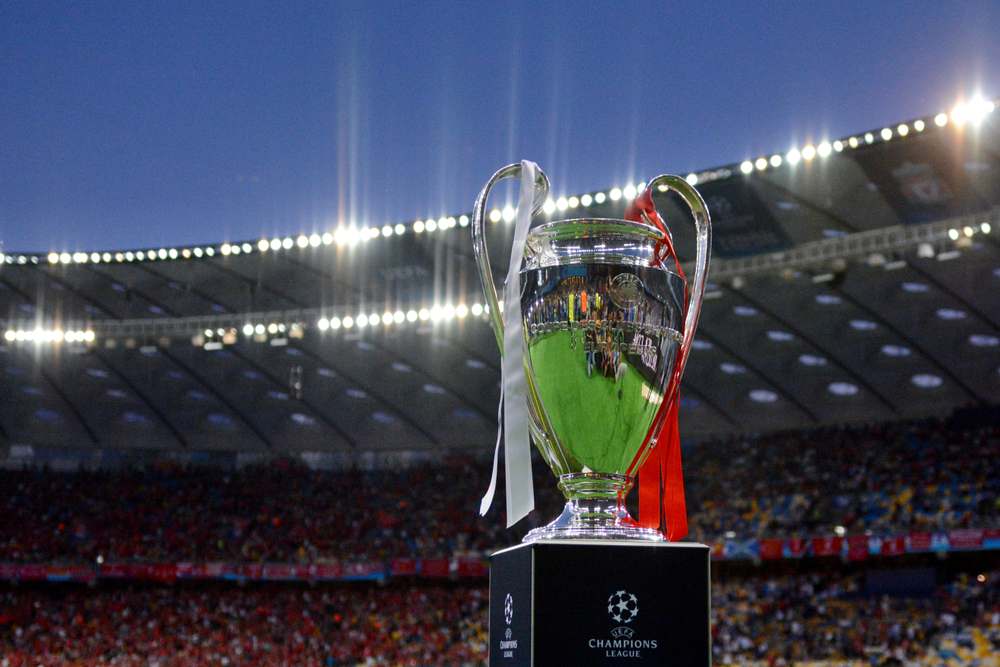Warning on risks: Financial contracts for difference are complex instruments and are associated with a high risk of rapid financial losses due to leverage. On 76.44% of retail investor accounts, financial losses occur when trading financial contracts for difference with this provider. You should consider whether you understand how financial contracts for difference work, and whether you can afford to take the high risk of suffering financial losses. Please read the Risk Disclosures.


The Champions League as a Billion-dollar Money-making Machine
The new season of the main phase of the world's most famous club competition, the Champions League, kicked off on September 16. Thirty-six teams whose football associations are members of the European football association UEFA have made it to the league stage. In addition to sporting prestige, there is a lot of money at stake. The Champions League winner will receive tens of millions of euros. The organizing body expects to generate more than €5 billion in revenue this season. In his analysis, broker Ozios looks at the Champions League and other UEFA ventures as a business. Analysts also investigated whether and how small investors can also profit from this money-making machine.
UEFA expects revenues of €5.2 billion for the 2025–2026 season. The Champions League alone will bring in €3.9 billion, or 75 percent of all budgeted revenues. [1] By comparison, in the previous two seasons, the Champions League generated €3.2 billion (2023/2024) and €3.8 billion (2024/2025) for UEFA.

UEFA reports that 81 percent of its revenue comes from the sale of media and broadcasting rights, another 16 percent comes from commercial rights, and the remainder comes from ticket sales and other minor items.
What happens to UEFA's more than €5 billion budget? The largest portion (€2.5 billion, or almost half) is distributed among the Champions League participants. The Champions League itself is UEFA's most profitable venture, generating a profit of around €1.4 billion. However, UEFA does not keep the money. €583 million goes to the UEFA Europa League participants, another €295 million goes to the Conference League participants, and over €70 million goes to the Women's Champions League and the Women's European Football Championship. Even so, UEFA expects an operating profit of €371 million for the 2025/2026 season. However, it does not keep the money, but distributes it further, mainly in the form of so-called solidarity payments.
Of course, UEFA is not a profit-making organization, nor is it a joint-stock company in which investors can participate in its profits. From their perspective, if they want to link their investments to the success of UEFA club competitions, then it may be important which companies are partners or sponsors of the Champions League in particular. The following companies have sponsorship contracts with UEFA. Heineken (brewer and producer of other beverages), Lay's and PepsiCo (producer of potato chips, food, and beverages), Playstation and Sony (video game producer), FedEx (delivery company), Just Eat Takeaway.com (food ordering app) and Mastercard (financial services), Qatar Airways (airline), Bet365 (betting company) and Crypto.com (cryptocurrency trading platform).
The amounts paid by these companies to UEFA for the opportunity to gain visibility during the Champions League have not been disclosed. However, according to GlobalData, UEFA collected approximately €665 million in sponsorship fees for the Champions League alone in the 2024/2025 season. The GoaltheBall.com portal reports that Heineken will pay UEFA €65 million per season until 2027, Sony (Playstation) €55 million, and Mastercard €52 million per season.
It is precisely those brands and companies that "latch onto" the Champions League brand that do so in an effort to capitalize on the competition's ever-growing popularity. Many of them are publicly traded on stock exchanges, and the fact that these companies are associated with the world's largest club competition can help them in their core business and thus ensure better economic results than if they stood outside the world of soccer.
The following Champions League sponsors are publicly traded companies:

However, it should be noted that the impact of Champions League sponsorship on the economic condition of a particular company cannot be reliably measured. Much more important for the value of these companies is the overall economic development in the world or their specific market, including their specific economic condition.
The sector in which these companies operate is also important. In general, the food production sector (in this case Heineken, PepsiCo, and Just Eat Takeaway.com) tends to be less susceptible to economic cycles. The electrical engineering market (Sony), on the other hand, may be subject to waves of innovation that could mean the arrival of new competitors on the market. Delivery and financial services (FedEx, Mastercard) are more influenced by overall macroeconomic developments at both the national and global levels. These factors should be kept in mind when making investment decisions, regardless of whether the company in question is a sponsor of the Champions League or other sporting competitions.
Adam Austera, analyst Ozios
[1,2] Forward-looking statements are based on assumptions and current expectations, which may be inaccurate, or on the current economic environment, which may change. Such statements are not guarantees of future performance. They involve risks and other uncertainties that are difficult to predict. Actual results may differ materially from those expressed or implied in any forward-looking statements.